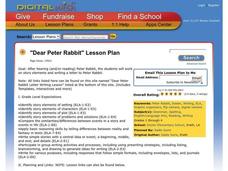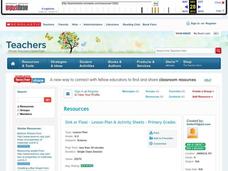American Museum of Natural History
Dive Into Worlds Within the Sea
The ocean is a series of ecosystems within an ecosystem. Learners dive into an exploration of ecosystems in an interactive lesson. They identify connections between organisms by following leading prompts within the lesson. The resource...
Berkeley Lab
Virtual Frog Dissection Kit
Fluffy is one of the most common names for a pet frog. Fluffy, the digitized frog in this dissection kit, opens up quite literally to allow scholars to see what's inside. The basic kit encourages pupils to click on various organs to see...
Scholastic
Study Jams! Aquatic Ecosystems
Mia's friends are fish-sitting while she is away on vacation. Zoe divulges to Sam that different animals need different habitats, and that there are both freshwater and saltwater ecosystems. Examples of the kinds of organisms found in...
Curated OER
Looking at Food Chains
In this Looking at Food Chains learning exercise, students read about a food chain under the sea and underline important information. Next, students fill in a graphic organizer about food chains based on the information they just read.
Curated OER
Archeologists For a Day
Students listen to a reading about fossils and go on a hunt for items with fossil characteristics. In this cross curricular fossil instructional activity, students will examine their fossil finds and create a graphic organizer. ...
Curated OER
Separation Techniques
Wow! Expose your chemistry class to every method of separating mixtures by showing this slide show. Learners will view diagrams and graphic organizers that support notes about filtration, chromatography, distillation, centrifugation, and...
Curated OER
Chemical Equations and Reactions
Graphic organizers, photos, diagrams, and text bring the world of chemical reactions to life. By viewing this presentation, young chemists learn how to recognize when a chemical reaction has occurred, and how to balance chemical...
Curated OER
Using Multicultural Literature with Science
Fourth graders listen to The Great Ball Game and discuss the roots of the tale. In this multicultural tale students identify the realistic facts about the Abnenaki Indians. Students use the Internet to find out about the author and...
Curated OER
Science: Invent a Gadget
Third graders invent gadgets using simple machine principles. Once they have assembled graphic organizers containing information about their invention, they draw diagrams and explain how their gadget works. Lastly, 3rd graders write...
Curated OER
Tree Graphic Organizer
In this tree worksheet, students write a tree type in the middle of the graphic organizer and then fill out the 4 parts of the graphic organizer. Students fill out parts for definition, characteristics, examples, and non examples.
Curated OER
Peek at the Chesapeake!
Students research organisms that live in the Chesapeake Bay ecosystem. In this science lesson, students choose an organism and research how it is affected by humans. Students create a presentation of their findings.
Curated OER
Dear Peter Rabbit
Write dear old Peter Rabbit a letter with this lesson. First, youngsters listen to the story Peter Rabbit and analyze the story elements. Then they complete a story map graphic organizer in order to write a letter to Peter Rabbit using...
Curated OER
Photosynthesis
Fifth graders work in small groups to brainstorm responses to a problem related to some disaster that wipes out half or all plant life on earth. Groups complete a graphic organizer to compare and contrast their ideas. Students select...
Curated OER
Exploring Arizona's Biotic Communities Lesson 1: Mapping Biotic Communities
As part of a unit on Arizona's biotic communities, young ecology learners create a map. They describe how humans and animals adapt in their habitat. They take notes and create graphic organizers from articles they read. Beautiful maps,...
Curated OER
Changing Seasons
Explore expository writing and using precise language in this descriptive paragraph writing lesson. Learners brainstorm prior knowledge about the changing seasons in Ohio. They describe seasonal items, view seasonal pictures from...
Curated OER
Sink or Float
Using a variety of objects, learners conduct buoyancy experiments. They make predictions on which object will sink or float and test their predictions. They use a graphic organizer to record their findings.
National Wildlife Federation
Bison Mystery Box
Natural design is amazing. Young scientists connect the features of a bison to an assortment of everyday items. A bison's tail is an ideal flyswatter, and a pot stores water just like a bison's stomach. The lesson plan connects the...
Curated OER
Characteristics of Living Things
Have your life science learners draw a graphic organizer as they view this PowerPoint. One click at at time, it presents the characteristics of living things in an organized manner, and tacks on a cute picture to help illuminate each....
US National Library of Medicine
Monster Genetics Lab
Harness young scientists' knowledge of genetics with an engaging science activity. Students start by flipping a coin to determine the genotypes and phenotypes of two parent monsters, before using Punnett squares to determine the...
Core Knowledge Foundation
A Time for All Seasons - Summer
The sun is shining and the birds are singing, what better time to teach young learners about the fun season of summer. In this week-long science series, children learn how the rotation and orbit of the earth influence the days and...
Polar Bears International
Taking Action!
Motivate young scientists to stand up and take action with this environmental science instructional activity. To begin, the class works in small groups brainstorming actions that support the conservation of the earth before creating and...
Cornell University
Plant Cell Crime Scene
Use science to solve the mystery of the Poplar murder. Pupils use forensic botany to determine if a suspect could be the killer. By analyzing images from a Transmission Electron Microscope, learners determine if the material found on the...
Oklahoma State University
Hairy Heredity
Young scholars learn that heredity comes down to the flip of a coin with this cross-curricular math and science lesson. Using smiley faces as a model, students toss coins to determine which dominant or recessive traits will be passed on...
EngageNY
Paraphrasing Quotes and Analyzing Visual Elements, Part 4: Investigating the Scientific Method with Max Axiom Super Scientist
Problem solved! Readers continue their work on determining gist and paraphrasing problem-solving steps by reading section four of Investigating the Scientific Method with Max Axiom Super Scientist. Learners complete a graphic organizer...

























